18th Anniversary Special
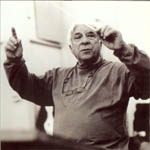
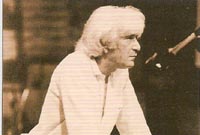
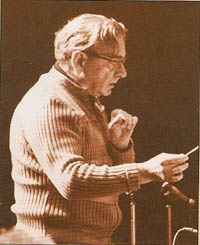
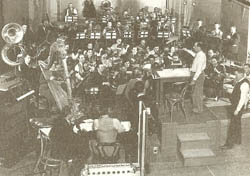
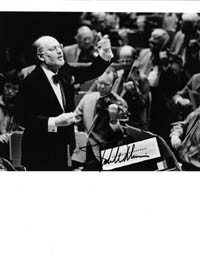
Pictures of film composers in concerts or recording sessions
(from the top):
Elmer Bernstein
Jerry Goldsmith
Miklos Rozsa
John Williams
Max Steiner
All five composers are represented on the lists below by FMR critics.
Film Music Review began as an online e-zine with Volume 1, Number 1 on 8 July 1998.
In that first issue there were 6 scores and 4 compilations reviewed, with the highest ratings going to Max Steiner's KING KONG (Marco Polo re-recording) and John Williams CLOSE ENCOUNTERS OF THE THIRD KIND (Arista expanded CD).
These are some of the comments sent in after that first issue appeared:
- "Clearly you have a long view of this art form - and that is good!" --
Bob Bowd
- "I was very impressed when viewing your site...I appreciate your taste in film music" -- Matthew Gear
- "Enjoyed your web site - nice job and very informative"--
Randall D. Larson, CD reviewer and magazine editor
- "I want to congratulate you on your new site - for me it's one of the best review sites on the net (or in print) simply because it gets to the 'meat' of the story without all the fluff and nasty personal grudge stuff that seems to be standard at some other sites" --
Mark Northam, Publisher, Film Music Magazine
- "Excellent site - straightforward, no nonsense and to the point. Every film music buff should visit it." -- David Wishart, late CD producer and writer
Now one of the longest-running e-zines of its kind, Film Music Review has grown to an impressive size
with many Book, CD, and DVD reviews.
.jpg)
Comments about this popular book from respected film composers:
"Thank you for your kind letter and the copy of your film music book.
Congratulations and best wishes for success
in your future contributions to the film music literature."
-- John Williams
"I do feel your book is done in a most interesting way. It affords a quick overview of what has not become a very, very broad field. Congratulations!"
--Elmer Bernstein, late film composer and conductor
"Your film music guide should be available to anyone interested in the Golden Age and beyond."
-- John Morgan, film composer/score restorer
Read more about this book --click here
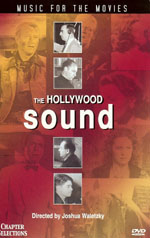
If you enjoy music from older films, this DVD is highly recommended. It includes music by Erich Wolfgang Korngold, Alfred Newman, David Raksin, Max Steiner, Dimitri Tiomkin, and Franz Waxman.
Music for the Movies: The Hollywood Sound
From the files of Film Music Review...


Film Music Review
18th Anniversary Special
A Note of
Putting together an online e-zine of any kind is not an easy task and usually goes unheralded. It takes many hours to write and organize the information, and then to publicize it online to film music fans everywhere.
I assume other film music sites also spend considerable time in their preparation and are deserving of support.
Also deserving of praise for film music restoration and preservation are CD labels such as: Film Score Monthly, Intrada, Monstrous Movie Music, Tadlow, Tribute Film Classics, and Varese Sarabande, which have all received Sammy Film Music Awards over the years.
This online e-zine is part of American Music Preservation.com so the focus has been more on older scores and less on present day film music.
Some film music fans have very narrow interests and seem to think if a critic disagrees with their favorite soundtrack or composer that critic is treated as if he or she is an idiot. I strongly disagree with this view and also the nasty messages that sometime buzz across cyberspace by some anonymous fans who haven't learned how to behave. Everyone is entitled to their opinions but they should be treated with some respect -- and that includes film music critics. Disagreement is fine, personal attack or ridicule is not. After all, critics are fans of film music too.
I'm especially pleased to express my gratitude to my staff critics, Steven A. Kennedy and Steve Vertlieb, for their commendable writing and views about film music. Both of them have greatly helped to make FMR a more interesting and diverse online e-zine.
A few years ago, I asked our critics to select some of their favorite film scores. I think these lists are worth repeating and you might have some of the same choices.
Your comments about this anniversary special are welcome and you are invited to read other news and reviews that is posted on FMR.
Music for motion pictures is one of the great pleasures in our popular culture.
Let's all continue to support the preservation of worthwhile film music from the past as well as from the present day.
Yours filmmusically,
Roger L. Hall
Managing Editor, Film Music Review (FMR)
8 July 2016
Send your comments to:
FMR 18h anniversary
Film Composers Chosen By All Three FMR Critics:
Elmer Bernstein
Jerry Goldsmith
Bernard Herrmann
Erich Wolfgang Korngold
Alfred Newman
Alex North
Miklos Rozsa
Franz Waxman
John Williams
One Film Score Chosen By All Three FMR Critics:
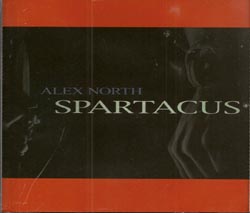
SPARTACUS (1960) - Alex North
Film Scores Chosen By Two FMR Critics:
THE BEST YEARS OF OUR LIVES (1946) - Hugo Friedhofer
KING KONG (1933) - Max Steiner
TO KILL A MOCKINGBIRD (1962) - Elmer Bernstein
PLANET OF THE APES (1968) - Jerry Goldsmith

Favorite film scores by these FMR critics -
Selected by Roger L. Hall
Selected by Steven A. Kennedy
Selected by Steve Vertlieb
All three are members of the...

A few recommended CD releases
of vintage
film music--
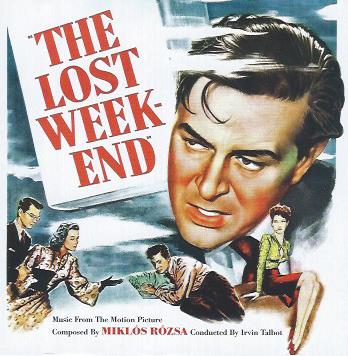
THE LOST WEEKEND (1945)
Music by Miklos Rozsa
Conducted by Irvin Talbot
INTRADA CD
22 tracks = 68:28
Miklos Rozsa wrote that "though SPELLBOUND had the more popular themes, THE LOST WEEKEND was an infinitely stronger score." I would agree that this score has more dramatic impact and has the most effective use of the theremin in any film of that time. Excellent CD notes by Frank K. DeWald.
This score by Rozsa is listed on
100 Essential Film Scores
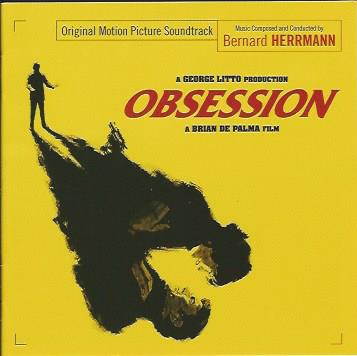
OBSESSION (1976)
Music by Bernard Herrmann
Music
Box Records (Special Archive Edition - 2 CDs)
Disc One (74:00) has the complete film score.
Disc Two (39:07) has the 1976 soundtrack album.
One of Herrmann's most dynamic and distinctive film scores
for a
somewhat overwrought film thriller directed by Brian De Palma.
Very informative CD notes by Daniel Schweiger.
Also recommended is the re-recording by
The City of
Prague Philharmonic Orchestra,
conducted by Nic Raine
on CD and Blu-ray audio disc
available from Tadlow --
click here.
This score by Herrmann is listed on
100 Essential Film Scores
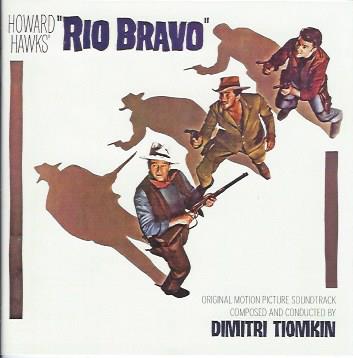
RIO BRAVO (1959)
Music by Dimitri Tiomkin
INTRADA
Disc One (27 tracks = 53:24)
Disc Two (34 tracks =
57:08)
The complete soundtrack along with extra cues
and the songs from this terrific Tiomkin western score
and one of his very best as well as one of the best westerns of the 1950s.
Extensive notes by Frank K. De Wald
and CD producer, Douglass Fake.
This score by Tiomkin is listed on
100 Essential Film Scores
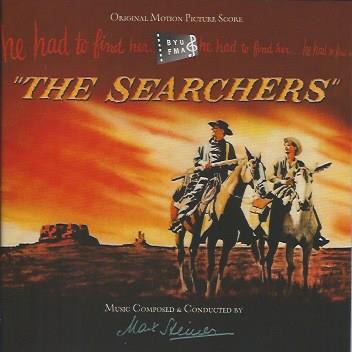
THE SEARCHERS (1956)
Music by Max Steiner
BYU MFA CD (36 tracks = 68:29)
This is a most welcome release with one of Max Steiner's
best film scores from his later career, and including prominant use of the
popular 19th century song, "Lorena." The title
song by Stan Jones
is sung by the western vocal group, Sons of the Pioneers. A worthwhile 20 year tribute essay
by James D-Arc is included in the handsomely produced booklet, which also has useful notes by CD Producer, Ray Faiola,
Chelsea Rialto Studios.
This score by Steiner is listed on
100 Essential Film Scores


The only real way for me to go about picking my favorites was to think about which scores I might listen to on a regular basis and the result is what you have below. This is no “best” ever list by any means and a lot of other choices had to go by the wayside.
Alfred Newman—CAPTAIN FROM CASTILLE
My first exposure to this score came from the concert march on one of the early John Williams and the Boston Pops LPs. So its recent availability on CD has made this great Newman score available.
Sergei Prokofiev—ALEXANDER NEVSKY
Probably one of the first film scores I may have owned music to in its cantata format. Prokofiev’s score is a masterpiece of music and is best appreciated, like all great film music, when it can be heard alongside this fascinating Russian classic. The “ Battle on the Ice” has to be one of the best cues in film music.
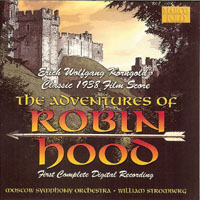
Erich Wolfgang Korngold—THE ADVENTURES OF ROBIN HOOD
Though I make my way through my Korngold collection about every two years, this particular score finds itself to my CD player more often than any of the other great works by this composer. You just cannot beat the swashbuckling sound of this score.
Miklos Rosza—SPELLBOUND
This may be a surprising selection, but I wanted to honor Hitchcock films in some way as they were always personal favorites. Though this one is less fascinating on film, there is no denying that creepy theremin in the score.
Franz Waxman—SUNSET BOULEVARD
Waxman is another difficult composer to determine just one score, but here I was most interested in choosing something that is a bit beyond his more Romantic works like Rebecca, or The Silver Chalice. This score is again one of those classic pieces of music that helps make this film one of the most engrossing works of the period.
Alex North—SPARTACUS
There is no denying the starkness and raw power North brought to this epic score. This was the film I most identified the composer with through the film’s many TV airings. The selection was a close call with WHO’S AFRAID OF VIRGINIA WOLFF?, another personal favorite.
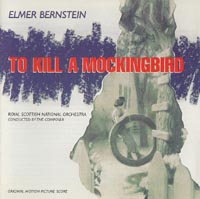
Elmer Bernstein—TO KILL A MOCKINGBIRD
You do not need me, or this website, to tell you what a great score and film is TO KILL A MOCKINGBIRD. The opening credits and music are so good at establishing the innocence one needs to really appreciate what follows and Bernstein’s music is simply beautiful.
Henry Mancini—THE PINK PANTHER
BREAKFAST AT TIFFANY’S might be the score an older generation would prefer of the Mancini lounge-crossovers of the period. THE PINK PANTHER, and its many sequels, was a popular matinee and TV film throughout my youth making this theme one of the first ones I tried picking out at the piano.
.jpg)
Bernard Herrmann—FARENHEIT 451
Picking just one Herrmann score is probably impossible, but this science fiction score is so amazing in its orchestration and color that it is hard to resist. The runner-up Herrmann score for me was THE SEVENTH VOYAGE OF SINBAD, another of those great Harryhausen effect films that were being shown often for kid matinees.
Bronislau Kaper—MUTINY ON THE BOUNTY
I came to Kaper’s MUTINY ON THE BOUNTY more through its opening titles music and other excerpts on film music compilations over the years. Its recent full appearance on CD makes this score so much more accessible to enjoy in its entirety.
John Barry—THE LION IN WINTER
For some it’s Bond, but for me, the Renaissance styles Barry adapted in THE LION IN WINTER make this film far better and manage somehow to stay out of the way of the many strong performances.
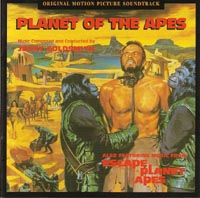
Jerry Goldsmith—PLANET OF THE APES
The PLANET OF THE APES original and its subsequent sequels were common TV fare when I was a kid. I was even a fan of the TV series (and had a couple of action figures which I wish I still owned!). Goldsmith’s music was so very different from anything else I had heard in a film. “The Hunt” sequence is still one of my personal favorites. There are many great Goldsmith scores during the 1960s that we are all getting reacquainted with these days.
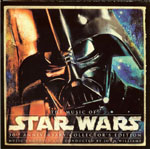
John Williams—STAR WARS
It perhaps is appropriate to end with the score that was my true entry into film music fandom, though of one particular composer, John Williams. I listened to this score so much, that I still have trouble with the more recent re-mastered and re-edited releases of the music that appeared on RCA/BMG a decade ago. But it feels like the right place to stop as we end up with another swashbuckling score in the shadow of Korngold.
Here’s to another great year of reacquainting ourselves with more great film music!
by Steven A. Kennedy

